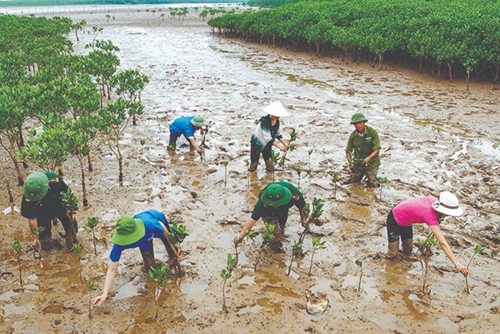Therefore, the Government of Vietnam has been striving to combat natural disasters by reducing risks and promoting preparation and development for different climate change-related scenarios. These activities have further affirmed Vietnam’s policies on guaranteeing human rights, especially the rights of vulnerable groups in the society.
    |
 |
|
Vietnam actively responds to climate change. (Photo for illustration: baotainguyenmoitruong.vn) |
It is worth noting that the Government of Vietnam has made a strong political commitment to responding to climate change. At forums on the cooperation on climate change response or during diplomatic meetings, Vietnamese leaders have always emphasized the realization of international commitments and the effective implementation of related international commitments, and wished to coordinate with other countries in the field.
Especially at the 74th session of the United Nations (UN) General Assembly in New York (the US) this September, Prime Minister Nguyen Xuan Phuc and other world leaders voiced their support for the birth of an urgent new agreement on people and nature. In a short video screened at the event “Leaders for nature and people,” PM Phuc confirmed that Vietnam is joining the world and making all-out efforts to implement the transition process toward green and circular economic models. Phuc stressed that Vietnam resolutely does not exchange environment for economic development and infringe sustainable development. The Vietnamese Prime Minister said that Vietnam always places climate change response, natural resource management, and environmental protection in important positions in its issued resolutions and development orientations.
It is also worth mentioning one of the initiatives marking Vietnam’s term (2014 - 2016) as a member of the UN Human Rights Council was on climate change. At that time, Vietnam proposed initiatives related to efforts in response to the impacts of climate change, the guarantee of the rights of vulnerable groups, and implementation of sustainable development goals. Based on Vietnam’s initiative, a resolution on climate change, co-authored by Vietnam, the Philippines, and Bangladesh, was approved by the UN Human Rights Council. The resolution focuses on the impacts of climate change on women’s rights.
Remarkably, having outstandingly completed its term, and although the country is no longer a member of the council after holding this position twice, Vietnam has continued to pursue initiatives proposed at the council, including those on responding to climate change and guaranteeing the rights of vulnerable groups. Vietnam will promote similar initiatives and topics related to this issue at bilateral and multilateral forums such as the UN Socio-Economic Council (ECOSOC) and UNESCO Executive Board. In the region, Vietnam can integrate issues of concern in activities of ASEAN mechanisms and ASEAN Intergovernmental Commission on Human Rights (AICHR).
Vietnam is targeting to run for a seat at the UN Human Rights Council for the third time in order to further pursue and promote its initiatives, including the climate change ones.
The UN High Commissioner for Human Rights Michelle Bachelet once said that the UN Human Rights Council can play an important role in dealing with climate change. And at the 42nd regular meeting of the council this September, she re-affirmed the priority to promote human rights in the context of climate change and added that the world has never faced a bigger challenge than it is now.
As one of the five countries most severely affected by climate change, Vietnam is acutely aware of the importance of climate change response and the need to focus on adding approaches to protecting the health of the community and vulnerable groups in the society, ensuring the right to food, housing, education, and benefiting from national programs and policies on climate change.
Translated by Mai Huong